Having Your Cake and Eating It, Too

A slightly modified version of this article appeared in American Greatness on June 6, 2018
Justice Kennedy wants to have it both ways—promoting gay rights without the appearance of coercing those who object
Masterpiece Cakeshop, Ltd. v. Colorado Civil Rights Commission, decided by the U.S. Supreme Court on Monday, was the most closely-watched case of the 2017-2018 term, for good reason. In a classic culture war match-up, a devout Christian baker, Jack Phillips, was pitted against a same-sex couple, who were incensed that Phillips refused—on religious grounds–to create for them a custom wedding cake to celebrate their union. When the Colorado Civil Rights Commission ruled against Phillips, at about the same time that wedding photographers, florists, cake bakers, and other vendors faced similar claims of discrimination against gay couples in other states, the coercive implications of “marriage equality” provoked popular outrage.
Phillips represented the opposition many Americans feel to progressive bureaucrats and judges, who have aggressively promoted the LGBT agenda—including, in the 2015 Obergefell decision, a constitutional right to same-sex marriage—running roughshod over the sincere moral convictions held by a majority of voters in most states. Prior to Obergefell, SSM advocates contended that gays simply wanted to enjoy the same legal rights as heterosexual couples. Kumbaya and all that. Many decent, kind-hearted citizens—taking the LGBT rhetoric at face-value, were sympathetic. Cases like Masterpiece Cakeshop, however, seemed to represent a treacherous bait-and-switch; as soon as the campaign for “marriage equality” had been won, mean-spirited proponents of SSM began to insist—using all the coercive power of the state—that the public not only recognize gay marriage but approve of it—even celebrate it.
Dissenters, it became clear, would be punished. In fly-over country, where being held in open contempt by coastal elites provoked a populist backlash, resulting in the election of President Trump in 2016, people understandably felt they had been suckered—once again, played for dupes by the liberal establishment. They were furious.
The actual scenario in Masterpiece Cakeshop was slightly more nuanced than that: the case arose prior to Obergefell, and involved a Colorado “public accommodations” statute prohibiting discrimination by businesses on the basis of sexual orientation. Moreover, Phillips was not a stand-in for the average businessowner with qualms about SSM; the facts of the case were highly particular and focused on the “expressive” nature of his custom cakes. Phillips’ defense did not consist of simple moral opposition—let alone the inherent right to refuse service to whomever he wished–but the much-narrower claim that being forced to bake a custom cake would violate his First Amendment rights. Nevertheless, the case became a potent symbol of the resistance of the nation’s “silent majority” to the liberal judicial activism that produced Obergefell.

This created an awkward situation for the Supreme Court, for two reasons. Normally, the black-robed mandarins who issue Delphic rulings “interpreting” the Constitution from their marble temple in Washington, D.C. do so with the same anonymity as the imposter behind the curtain in the Wizard of Oz. Cowed observers are usually so taken with the trappings of SCOTUS’s grandeur—like the belching smoke and fire in the 1939 movie—that they do not question its pronouncements. But this time, the natives—those pesky Deplorables–were restless. And, even worse, they were paying close attention.
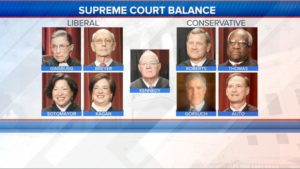
The second reason is Justice Anthony Kennedy’s vanity. As he completes three decades on the Court, as President Reagan’s third choice for the seat vacated by the retirement of Lewis F. Powell in 1987 (Kennedy was nominated only after Robert Bork was shamefully denied confirmation and Douglas Ginsberg was forced to withdraw over reports of past marijuana use), the 81-year-old Kennedy is very concerned with his “legacy.” Whether he will hang on, as the “Notorious RBG” has, or depart while a Republican president is in office (enabling President Trump to nominate his successor), Kennedy is nearing the end of his judicial career.
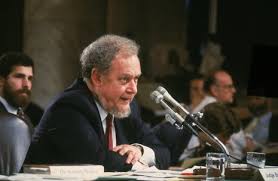
Kennedy’s proudest achievement on the Court is his tireless promotion of gay rights, doggedly conjuring them from a Constitution silent on the topic, invoking treacly sentiment—bordering on the spiritual—to divine constitutional protections from “the mystery of human life” and similar folderol. I have previously described Kennedy’s leading role in the Court’s evolving recognition of gay rights, including authoring Obergefell, and will not repeat that discussion here. Suffice it to say that Kennedy knows his eventual obituary will lead with a reference to Obergefell, and like all vain mortals, he wants the context to be favorable.
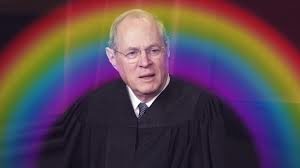
Kennedy’s dilemma with Masterpiece Cakeshop is that the case was a lightning rod for criticism of his cherished life-work. He couldn’t stand to retire—if not at the end of this term, then soon—on the discordant note of ruling against the sympathetic cake baker, Jack Phillips. That would have cast doubt on the bona fides of the crusade Kennedy has been leading since 1996, when he wrote the decision in Romer v. Evans, the first step down the slippery slope leading to Obergefell. The solution? Rather than picking a winner in the divisive culture war that he himself had created, Kennedy found a technical basis for avoiding a lasting, substantive resolution. Masterpiece Cakeshop is not the landmark precedent some observers were expecting.
As has been widely-reported (this case being the subject of the nation’s undivided attention, after all), Kennedy did not reach the merits of the case and in effect disqualified the Colorado Civil Rights Commission—which had ruled against Phillips—due to derogatory, anti-religious statements made by some commissioners in the course of their ruling. Among other things, some commissioners called Phillips’ religious objections “despicable.” Kennedy made a fuss about these same statements during oral argument in December, prompting my prior article for American Greatness, “Justice Kennedy’s Too-Late Lament for Tolerance.” As I remarked on the AG blog, “Justice Kennedy would make a lousy poker player. He revealed his hand during oral argument on December 5. He and some of the other Obergefell majority (Kagan and Breyer) were embarrassed by the blatant anti-religious bias of the Colorado agency, so they ruled in favor of the baker, Jack Phillips, to disassociate themselves from such intolerance.”

Hence, the title of this article: “Having Your Cake and Eating It, Too.” Kennedy and some of the other activists who joined the 5-to-4 decision in Obergefell (namely, Justices Elena Kagan and Stephen Breyer) wanted to bask in the spotlight of “enlightened” elite opinion that applauds the invention of made-up constitutional protection of gay rights, without having to face the opprobrium that would have ensued if the Court ruled against Jack Phillips, the symbolic Everyman. (The Wall Street Journal gets a runner-up award for best title, with “The Supreme Court’s Half-Baked Cake.”)
Although Kennedy’s opinion for a 7-to-2 Court in Masterpiece Cakeshop is being reported as a “victory” for religious objectors such as Phillips (and in a technical sense it is), the decision does not back away from the Court’s unprincipled LGBT jurisprudence one iota. Here is how Kennedy begins the analysis section of his decision:
Our society has come to the recognition that gay persons and gay couples cannot be treated as social outcasts or as inferior in dignity and worth. For that reason the laws and the Constitution can, and in some instances must, protect them in the exercise of their civil rights. The exercise of their freedom on terms equal to others must be given great weight and respect by the courts. At the same time, the religious and philosophical objections to gay marriage are protected views and in some instances protected forms of expression.
You get the drift. Blah, blah, blah. The can got kicked down the road, so a future Court—perhaps without Kennedy, and with a less sympathetic plaintiff than the perfectly-cast Jack Phillips—can explain why a made-up constitutional right compels the obedience of objecting citizens. In the meantime, Kennedy’s opinion, like Powell’s in Regents of the University of California v. Bakke (1978), the landmark affirmative action case, provides plenty of sotto voce instruction for future bureaucrats—how to reach the same result without being so blatant.
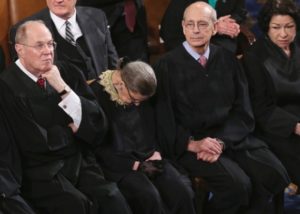
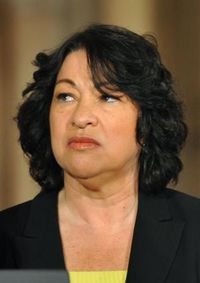
What else can we learn from Masterpiece Cakeshop? Here are a few take-aways. The anti-religious sentiment decried in Masterpiece Cakeshop, while notable for its overtness, is remarkably candid and indicative of what most progressives think about moral objections to homosexuality. Regulators and litigants are now on notice to conceal their actual motives. The dissenting opinion by Justices Ruth Bader Ginsburg and Sonia “The Wise Latina” Sotomayor indicates how extremely partisan they are—to the Left. They would have ruled against Phillips, regardless of the commissioners’ anti-religious comments, simply for refusing to make a wedding cake for the same-sex couple. To them, as die-hard ideologues, defying the conventions of political correctness is a strict liability offense.
Reading further into the tea leaves, the fact that Chief Justice John Roberts declined to join the concurring opinions of the conservative bloc of justices (Clarence Thomas, Samuel Alito, and Neil Gorsuch)—who wrote separately to defend Phillips’ First Amendment rights on the merits–may indicate either that Roberts is equivocal on the issue (which bodes poorly for future cases) or that he made some type of “deal” with Kennedy to get his vote in the travel-ban case (yet to be decided). The “animus of the decisionmaker” rationale of Masterpiece Cakeshop, while helpful in that case, may prove disadvantageous if applied to the pre-election comments of candidate Donald Trump. Kennedy’s opinion seemed to anticipate such comments, when it stated:
[T]he Court cannot avoid the conclusion that these statements cast doubt on the fairness and impartiality of the Commission’s adjudication of Phillips’ case. Members of the Court have disagreed on the question whether statements made by lawmakers may properly be taken into account in determining whether a law intentionally discriminates on the basis of religion…. In this case, however, the remarks were made in a very different context—by an adjudicatory body deciding a particular case. (Emphasis added.)
This distinction—between mere comments made by a lawmaker and those of an adjudicatory body—could become very important in the travel ban case.
Masterpiece Cakeshop is not a masterpiece. Several important decisions remain to be issued this month. Stay tuned.
Thanks to SCOTUSblog for the plug!































